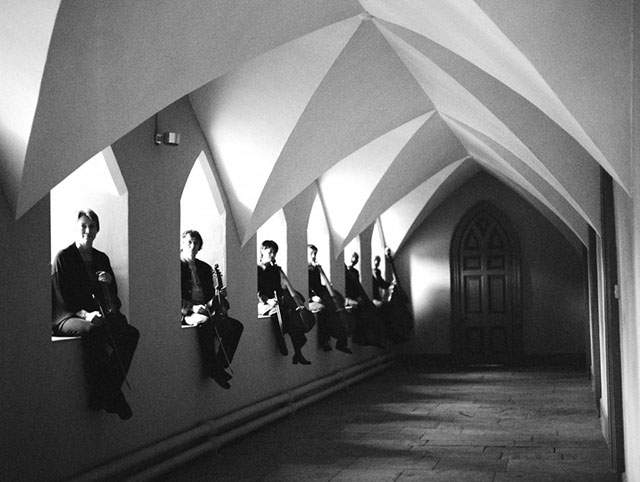
This hour on Harmonia, we continue our 3-part celebration of the British-based viol consort Fretwork. In honor of its thirtieth anniversary, we're exploring Fretwork's experiences with 500 or so years of rich repertory, ripe for viols. Our featured release, only slightly ironically, is John Jenkins: Six-Part Consorts, performed by Phantasm.
We heard two fantasias by Henry Purcell, from the recording Purcell: The Fantazias & In nomines, performed by Fretwork.
Australia
Fretwork visited Australia for the first time in 1992 and premiered their second piece of contemporary music in the Spitalfields (early music!) Festival: Michael Nyman's "The Self-Laudatory Hymn of Inanna and her Omnipotence," written for James Bowman and Fretwork. The reviewer in The Times regretted the need for amplification in the Nyman, which was interesting, as in actual fact, there wasn't any. Nyman's gutsy, aggressive piece brought forth volume on another level from that of the earlier music.
In Nomine
In 1995, the 300th anniversary of Henry Purcell's death, Fretwork received a grant from the Arts Council of Great Britain to commission 12 new pieces to reflect the 12 surviving fantasies that Purcell composed in 1680. Both the old and the new pieces appeared over the course of two full length, very scary concerts. If you know what an "In nomine" is, or even if you don't, listen first to this 6-part "In nomine" by Purcell, and now to this piece, also called "In nomine," by Gavin Bryars.
From the 1997 Fretwork recording Sit Fast, that was Gavin Bryars' "In nomine," his own reflection on Purcell, one of twelve such new pieces that Fretwork played, along with all the Purcell fantasies, in two concerts in 1995. Both pieces are late examples of a genre that goes back to the mid-16th century.
To date, the ensemble has commissioned more than sixty new works from some of the most important composers of our time, including, in addition to Nyman and George Benjamin, Elvis Costello, Tan Dun, Peter Sculthorpe, and John Tavener.
Birds on Fire
In 2001, Fretwork ventured even further afield: with the aid of the Contemporary Music Network they constructed a performance involving two dancers, choreographer Ian Spink, lighting, Michael Chance, and music by Gibbons, Tan Dun, Orlando Gough, Nyman, John Woolrich, and Andrew Keeling. This extraordinary event toured fabulous cathedrals of Britain on a seriously underfunded tour which found the ensemble driving (sometimes overnight) a truck full of staging to save the dancers from the cold stone floors, and theatrical lights; constructing and breaking down the set for each performance; surviving on sandwiches and coffee for a couple of exhausting weeks.
The tour led to a CD released in 2008 called Birds on Fire, in which Fretwork take on klezmer-influenced music as well as 17th-century Hebrew music with Jeremy Avis, here singing a psalm setting of Salamone Rossi "Ebreo," a 17th-century Italian composer.
There was still, and indeed still is, plenty of seductive repertory still left to investigate from the 16th and 17th century. Members of the ensemble grew into new repertory in a way that only an ensemble that has been playing together a good deal for many years can. They became interested in earlier European repertory for viols, acquiring a set of Renaissance viols, which have quite a different sound and feel than the traditional English viols that the ensemble had been playing to date. Members of Fretwork enthusiastically, if perhaps not expertly, embraced the challenges of earlier notation. Here is a piece by the late 15th-century Flemish composer Johannes de Stokem, entitled "Brunette," from the recording Petrucci: Harmonice Musices Odhecaton, recorded in 2001 by Fretwork for Harmonia Mundi.
Jenkins: Six-Part Consorts
Our featured release is the 2009 recording John Jenkins: Six-Part Consorts, performed, not by Fretwork, but by another British-based viol consort – Phantasm. This recording, originally released in 2009, was re-released in 2016 by Linn Records. It explores the music of 17th-century English composer John Jenkins, a contemporary of Lawes and Dowland.
Break and theme music
:30, Fretwork: The Fantazias & In nomines, Fretwork, Virgin 1995, Tr. 10 Fantazia 1 in D minor (excerpt of 2:59)
:60, Sit Fast, Fretwork, Virgin 1997, Tr. 1 Barry Guy: Buzz (excerpt of 6:01)
:30, Birds on Fire, Fretwork, harmonia mundi 2008, Tr. 1 Birds on Fire (excerpt of 5:53)
Theme:Â Danse Royale, Ensemble Alcatraz, Elektra Nonesuch 79240-2 1992 B000005J0B, Tr. 12 La Prime Estampie Royal
The writer for this edition of Harmonia is Wendy Gillespie.
Learn more about recent early music CDs on the Harmonia Early Music Podcast. You can subscribe on iTunes or at harmonia early music dot org.









